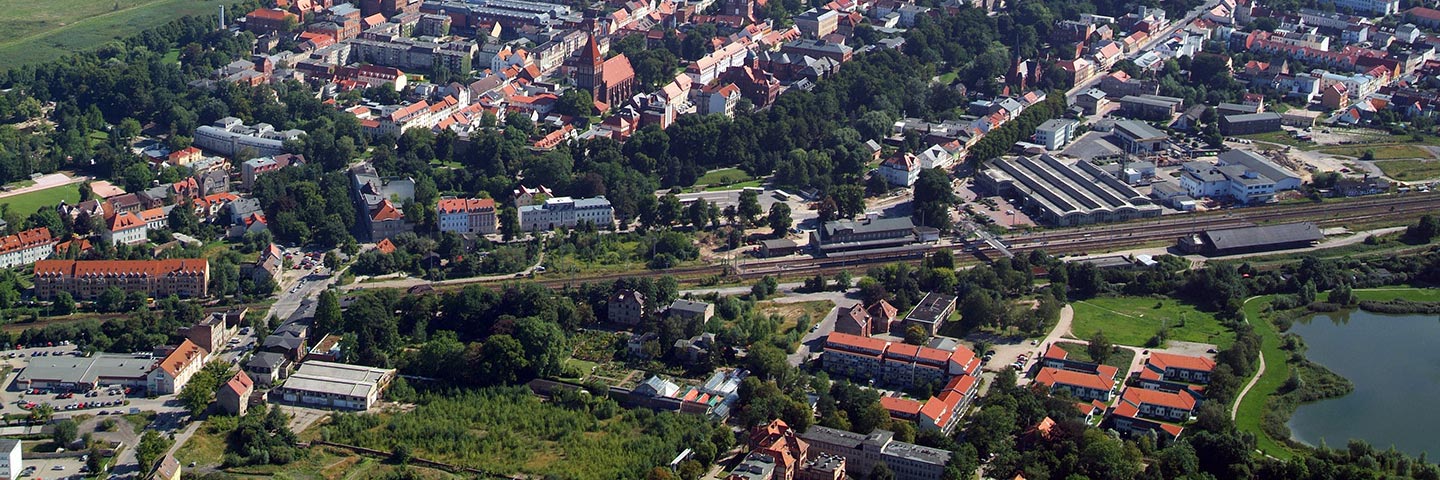News/All pieces
3 new funding programmes for paludiculture projects
Paludiculture in practice, young scientists, water and nutrient management – new calls for proposals will be issued in October. Ideas can be developed and submitted until the end of January 2026.
10/11/2025 The Federal Ministry of Agriculture, Food and Rural Affairs (BMLEH) wants to further promote climate protection through peatland conservation and is intensifying its research funding. The three calls for funding address paludiculture management techniques, water and nutrient management, and young scientists.
Funding for ‘‘Research into innovative cultivation techniques for paludiculture“ is intended to support practical research with rapidly available technology and knowledge transfer in the field of land management and the extraction of renewable raw materials from paludiculture. The Ministry is offering young researchers up to five years of funding for the collection and modelling of data on rewetted moorland sites. Funding for „Water and nutrient management of paludiculture“ is intended to generate knowledge on the hydrology and nutrient supply of wet moors and paludiculture at the regional level.
What's, when it's wet
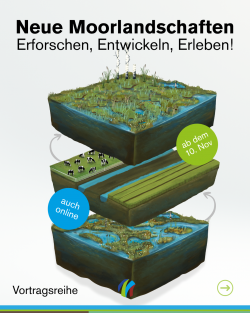
New lecture series
05/11/2025 In the six-part public lecture series ‘Neue Moorlandschaften“ (German only), researchers report on how new ecosystems are emerging from drained areas, how they function – and what opportunities they offer. The lecture series accompanies the WETSCAPES2.0 Collaborative Research Centre at the University of Greifswald, which is researching how rewetted fens function.
Prof. Dr. Jürgen Kreyling, spokesperson for WETSCAPES2.0, will kick off the series with his lecture ‘Moorlandschaften 2.0 – Was ist das und wie funktionieren sie?’ (Peatlands 2.0 – What are they and how do they work?).
Monday, 10 November 2025, 6 p.m.
Alfried Krupp Wissenschaftskolleg, Martin-Luther-Straße 14, Greifswald
Online participation possible via the college's digital lecture hall
Further information and dates:
https://www.wiko-greifswald.de/programm/vortraege/vortragsreihen-im-sommersemester-2025/wetscapes-20/
The Collaborative Research Centre/Transregio 410 WETSCAPES 2.0 is funded by the German Research Foundation (DFG) and supported by the University of Greifswald and the University of Rostock.
Peatland Breakthrough
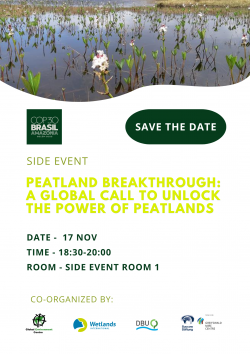
A Global Call to Unlock the Power of Peatlands for Climate, Nature and People. This session will explore how the Peatland Breakthrough is catalyzing global action, uniting countries, communities, and companies to restore and protect one of the world’s most carbon-dense ecosystems.
04/11/2025 This official side event is a pre-launch milestone for the Peatland Breakthrough, a high-ambition global effort under the UNFCCC 2030 Breakthrough Agenda, and a call to action and commitment to scale up efforts towards the conservation, restoration, and sustainable, wise use of peatlands. Engaging with a broad audience from the whole of society, this event presents the Peatland Breakthrough and its Science-Based Framework for Global Targets and Guiding Principles, and announces the opening of its endorsement process. There will be two roundtables; the first with Ministers and high-level government representatives to share their national perspectives and commitments to advancing the Peatland Breakthrough. A second roundtable will engage non-state actors to share their experiences and how they can contribute to the Peatland Breakthrough, demonstrating how involving different actors is key to transforming the targets into practical action and impacts on the ground.
The session will highlight the growing coalition of Champion Countries and partners, showcasing how collective leadership and multi-sector partnerships can mobilize knowledge, policy, and finance for transformative peatland action. The discussion will build momentum and shared ownership of the Peatland Breakthrough, reaffirming peatlands as critical ecosystems for climate mitigation and adaptation, biodiversity, water security, and resilient livelihoods.
💚 Monday, 17th November 2025, 18:30—20:00 (GMT-3)
💚 Side Event Room 1, Blue Zone, UNFCCC COP30, Belém Brazil
💚 In-person, register here
💚 Livestreaming available for COP30 virtual-only registered participants
The is event is co-organised by by Wetlands International, the Michael Succow Foundation (partner in the Greifswald Moor Centrum), Global Environment Centre and the German Federal Environment Foundation (DBU), in collaboration with the other Peatland Breakthrough partners, including FAO, the Global Peatlands Initiative, Landscape Finance Lab, UN Environment Programme and the Convention on Wetlands
New legal opinion
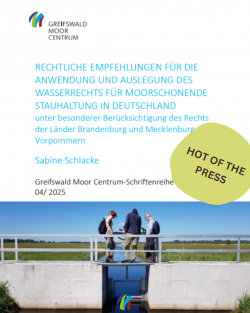
for peatland-friendly water management
27/10/2025 Peatlands play a key role in climate protection, but their rewetting often fails or is complicated due to legal hurdles and regulatory frameworks. A new opinion paper entitled “Legal recommendations and interpretation of water law for peatland-friendly water management in Germany” prepared by Prof. Dr. Sabine Schlacke, analyzes how water law in Germany needs to be adapted, particularly for sustainable peatland use. The key message: peatland-friendly water management is essential for the preservation of peatlands as CO₂ reservoirs and for adaptation to climate change, and must therefore be promoted – especially in the federal states of Brandenburg and Mecklenburg-Western Pomerania. The report contains recommendations for action by politicians and administrators to create legal certainty for land users and nature conservation.
The recommendations in the report are particularly relevant for Mecklenburg-Western Pomerania, as the Ministry of Agriculture has presented a draft amendment to the state water law, which is currently being discussed by the committees of the state parliament. This presents an opportunity to include provisions to facilitate procedures for peatland rewetting.
The report is aimed at decision-makers in politics, administration, and agriculture and shows concrete ways in which water law can better support peatland conservation measures. It is a publication of the GMC proceedings, developed in the MoKKA project by the University of Greifswald the Succow Foundation.
Peatlands at Futurium

Join the discussion on October 9!
3/10/2025 “More peatlands! But how?” – Futurium, the Joachim Herz Foundation, and the Greifswald Mire Centre are hosting an event under this title on October 9 in the heart of Berlin. Peatlands are key CO₂ reservoirs and, at the same time, controversial interests concerning land use. How can climate protection, agriculture, and local interests be reconciled? This question will be the focus of the expert discussion with visitor participation. from 19:30 p.m.
Moderator Katie Gallus will talk to:
• Lucas Gerrits, co-founder and managing director of Zukunft Moor GmbH
• Juliane Petri, farmer and agricultural consultant from Rhinluch/Kremmen
• Dr. Franziska Tanneberger, Director of the Greifswald Mire Centre
• René Seltmann, Agricultural Consultant for Peatland Protection at the Brandenburg State Office for the Environment (LfU)
The event at Futurium, Alexanderufer 2 in Berlin, is free of charge, but registration is required.
At New York Climate Week
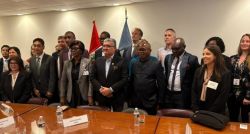
Momentum building for the Peatland Breakthrough
26/09/2025 Peatland Breakthrough is a call-to-action that aspires to enable systemic changes to protect and restore peatlands on a large scale. By bringing together governments, the private sector, donors, and civil society, the Breakthrough aims to help accelerate conservation, restoration, and sustainable and wise use of peatlands worldwide, guided by robust science-based targets and principles.
During New York Climate Week 2025, 25th September, governments, donors, international organisations, and the private sector, gathered for an exclusive high-level meeting hosted by the Government of Peru and partners of the Peatland Breakthrough. The meeting was a pivotal opportunity to mobilise broad support and strengthen partnerships to drive the Peatland Breakthrough forward, ensuring that peatlands are recognized as a key nature based solution for accelerating progress for the global climate agenda, while also contributing to biodiversity, water security, and sustainable livelihoods.
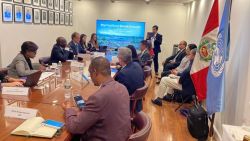
Peatland ecosystems hold unparalleled significance in combating climate change and achieving the goals of the Paris Agreement. They cover only 3% of global land surface but store up to one-third of the planet's soil carbon, double the carbon found in the world’s forest biomass. Beyond their climate mitigation benefits, peatlands enhance community and ecosystem resilience by regulating water flows, reducing flood and drought risks, providing critical habitats for flora and fauna, supporting livelihoods, and enhancing water quality. In fact, the estimated global value of peatland ecosystem services is about USD 2.3 trillion.
Unfortunately, peatlands are being degraded in every part of the world. They are drained for agriculture and forestry, eroded by overgrazing of livestock, mined for fuel and horticulture, and polluted by human activity. Infrastructure development disturbs their hydrology and many are deliberately burned. When we lose peatlands as healthy thriving ecosystems, we not only lose their ability to capture carbon, but conversely, they release large amounts of greenhouse gases. Degraded peatlands currently emit about 4 % of all anthropogenic emissions. Conserving and sustainably managing peatlands and restoring degraded ones must therefore be prioritised to accelerate progress in tackling climate change.
The meeting brought together potential Champion Countries and strategic partners to learn more about the Peatland Breakthrough, explore how they could contribute, and understand the benefits of engaging with this new climate breakthrough, both in the lead-up to its official launch and throughout its implementation. The event was hosted by Juan Carlos Castro Vargas, Minister of Environment of Peru, who emphasized Peru’s role as the first Champion Country of the Peatland Breakthrough.
Peru’s Minister of Environment emphasized the importance of collective action among countries, the private sector, and international partners to achieve clear, measurable goals for peatland protection and climate ambition.
Following presentations on the initiative, roundtable discussions featured high-level participants from the Republic of Congo, the Democratic Republic of the Congo, and Indonesia, who reaffirmed their commitments and highlighted the need for adequate financing to achieve their national climate targets.
Wetlands International, on behalf of Peatland Breakthrough partners, outlined the initiative’s draft global targets and guiding principles aimed at driving systemic change and collective impact. The organization underscored that investing in peatlands offers one of the most effective climate solutions—combining carbon storage, ecosystem resilience, and economic efficiency.
Potential donors and partners including The Nature Conservancy, Diageo, the Gordon and Betty Moore Foundation, and the Margaret A. Cargill Philanthropies expressed interest in contributing to the effort, exploring opportunities to align their work and investments with the global peatland and climate agendas.
Arlette Soudan-Nonault, Minister for the Environment, Sustainable Development and the Congo Basin, and Executive Secretary of the Congo Basin Climate Commission of the Republic of Congo, reaffirmed her country’s commitments to conserving the Congo Basin’s intact peatlands. She emphasized that conservation cannot be achieved without adequate financing for the energy transition and the country’s NDCs, which depend both on domestic resources and international support. In addition, high-level representatives from the Ministry of Environment and Sustainable Development of the Democratic Republic of the Congo, and the Ministry of Forestry of Indonesia presented their ongoing peatland programmes and shared the challenges they face, agreeing that the Peatland Breakthrough can help mobilize critical funding needed to meet their climate goals.
The United Nations Environment Programme (UNEP) emphasized the importance of the Peatland Breakthrough for achieving global climate goals and its relevance to the Paris Agreement, particularly ahead of the upcoming events at UNFCCC COP30. Collaboration and leadership from governments and donors are crucial to unlocking the full potential of peatlands. UNEP presented the current state of the world’s peatlands and progress made through joint initiatives such as the Global Peatlands Initiative and its Global Peatlands Assessment, highlighting that peatlands are a cost-effective nature-based solution that must not be overlooked.
Mara Angélica Murillo-Correa, Senior Programme Officer for Intergovernmental Affairs at UNEP, summed it up: “No Paris without peatlands.” Protecting and restoring peatlands is essential to closing the emissions gap and safeguarding biodiversity. The Peatland Breakthrough provides the political momentum and financial ambition to turn scientific knowledge into transformative global action.
The Peatland Breakthrough is a global call to action led by Wetlands International, the United Nations Environment Programme, the Food and Agriculture Organization of the United Nations, the Greifswald Mire Centre, and the Landscape Finance Lab, developed in close alignment with the Global Peatlands Initiative, and in collaboration with the High-Level Climate Champions Team and the Convention on Wetlands.
Our growing list of supporting partners includes: the Global Environment Centre, RE-PEAT, and The Nature Conservancy.
Image 1: Environmental ministers and leaders from NGOs and the private sector at the Permanent Mission of Peru to the UN, New York (Credit: GPI)
Image 2: Roundtable discussions ensued following exciting presentations on the Peatland Breakthrough (Credit: GPI)
Superfresh: the first ever
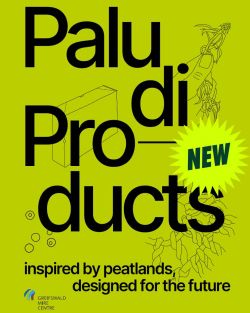
Paludi Product Catalogue
24/09/2025 Freshly launched at RRR2025 conference : The first ever Paludi Product Catalogue! With as many pilot products, prototyps and services related to paludiculture as we could assemble. The aim is to provide a comprehensive over view and to show how diverse, innovative and marketable this new form of land use already is today.
To showcase the innovative potential of this field and highlight the diversity of existing products the catalogue is intended for:
• Farmers – to demonstrate the existing demand for paludiculture biomass across a wide range of products.
• Companies – that already process paludiculture biomass or plan to do so, offering inspiration and opportunities for networking
• Research, policymakers, and society
What makes it special: It is open to further contributions and will be regularly updated and expanded in the future. All new and existing Paludi products can be included.
The catalogue is launched at the "Renewable Resources from Wet and Rewetted Peatlands - 4th International Conference on the Utilisation of Wetland Plants", which is part of the project PaludiZentrale. If you would like to place a product in the catalogue, you can contact the catalogue team by email at produktkatalog@greifswaldmoor.de.
New European Peatland Map
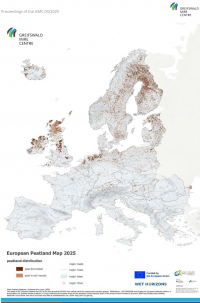
now available online
23/09/2025 The European Peatland Map (EPM2025) is now available on our website (including the geodata). It is a product of the Global Peatland Database (GPD), which is hosted at the Greifswald Mire Centre (GMC). It contributes to a consistent and regularly updated knowledge base on peatlands worldwide.
The dataset provides the most up-to-date overview of European peatlands. The EPM2025 integrates current national, regional and local datasets on peatlands and organic soils to represent peatland areas as comprehensively as possible, including degraded and drained peatlands, i.e. those used for agriculture. By providing the data in vector format, the map offers high spatial resolution, making it an indispensable resource for research, policy and nature conservation.
The EPM2025 is based on the peatland layer of the European Wetland Map (2024) but is directly accessible without the need for extraction from the more comprehensive wetland layer. It updates the ‘Peatland Map of Europe’ (Tanneberger et al. 2017), with all national datasets having been reviewed and replaced by more comprehensive or better quality GIS data According to the geodata, the total area of peatland in the countries covered is 38.4 million hectares (384,220 km²).
The EPM2025 was created as part of two EU-funded Horizon projects (ALFAwetlands and WET HORIZONS) and the European Climate Initiative (EUKI) of the Federal Ministry for Economic Affairs and Climate Protection (BMWK) and represents the best available knowledge at European level. More importantly, it is designed as a shared and evolving knowledge base and represents a warm invitation to the scientific and conservation community to further verify, refine, and continuously improve the data at national and regional scales across Europe.
Book of Abstract ready
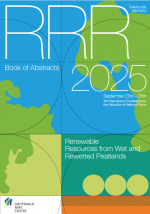
Get the full picture of RRR2025
20/09/2025 Here ready to be browsed: our Book of Abstract of the 4th international conference on “Renewable Resources from Wet and Rewetted Peatland - RRR2025. Apart from an overview of the programme and practical information it gives you full descriptions of key notes, excursions, sessions and workshops.
Paludiculture in series
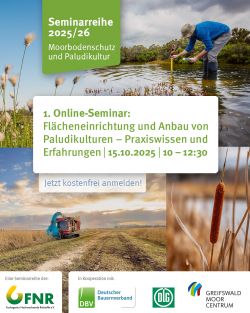
Four free seminars
10/09/2025 Register now for four seminar series ‘Peatland protection and paludiculture’ – online, free of charge and jointly organised by FNR e.V., DBV e.V., DLG e.V. and GMC.
The first seminar on 15 October 2025 will take place from 10:00 a.m. to 12:30 p.m. and focus on ‘Land preparation and cultivation of paludiculture’.
It will cover the following topics:
- Approval procedures and obstacles
- Planning, implementation and cultivation in practice
- Communication as the key to successful projects
further topics and speakers are:
• From knowledge to change – preserving moorland soils through structured cooperation
Katja Searles – Speaker, Brandenburg State Office for the Environment
• Tasks and obstacles in the approval process
Kerstin Norda – Managing Director, Nature Conservation Foundation of the District of Cuxhaven
• Practical challenges: planning, implementation and cultivation
Anke Nordt – Project Manager PaludiMV, Landgesellschaft Mecklenburg-Vorpommern
Click here to register.
